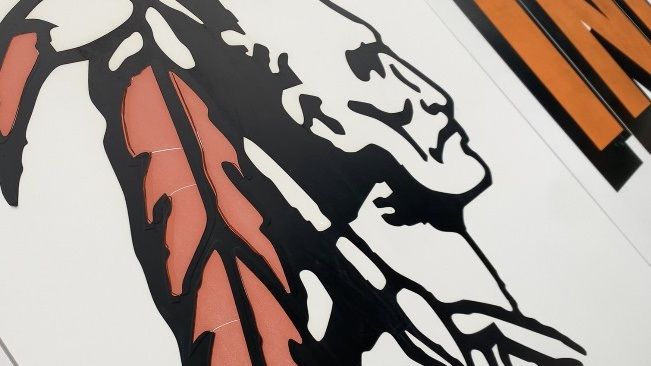In Cambridge, a debate is looming: Should the Washington County school district ditch its decades-old mascot the Indian?
Dillon Honyoust has lived in Cambridge for his entire life.
"There was never a sense of dehumanizing, or discrimination, or derogatory, negative feedback from the school or students within it toward our family," said Honyoust, manager at Hoosick Tire, located about a mile from the school.
The Honyousts descend from Onondaga and Oneida lineage. At the shop, their heritage is on full display. Honyoust and his family are defending the school’s nickname and logo portraying a native man wearing a traditional headdress.
"There are no bad intentions towards Native-American people," Honyoust said. "The intention is to showcase and honor them from this area."
Honyoust was involved with Cambridge athletics throughout his youth. He says being a Cambridge Indian was nothing but an honor.
"I remember as a little kid, playing as a Cambridge Cub, a Cambridge Tiger, and how cool it was," he said. "But I could not wait until I was a Cambridge Indian."
But there is mounting pressure across the nation for schools to steer clear of using native people as mascots. Some professional sports teams are even making changes.
"I’m not even saying the word Indians is racist, or the logo is racist, but the act of using native people as a mascot is racist," said John Kane, a 1978 Cambridge graduate.
Kane is Mohawk and lives on Seneca land in Western New York. He has spent years advocating for native issues across various platforms, including his YouTube channel ,"Let’s Talk Native TV."
In addition to believing the use of an Indian mascot is racist, he says it lacks historical accuracy and value.
"Most people in Cambridge have no idea about any native history associated with the area," he said. "When they claim to be Indians, they don’t even know what Indians they’re claiming to be."
Kane says he and the Honyousts are familiar with one another.
"They are speaking as a family that lives there in Cambridge," he said. "This is a personal decision, but they’re not the voice of all native people."
He and Honyoust recently shared their thoughts with the school board, which has a tentative timeline in place to decide whether to drop the name by March.
Kane says he’s committed to seeing a change to something more inclusive.
"The thing that Cambridge students, and frankly Cambridge residents, could be proud of, is when they’re asked, 'what did you do when the call for social justice occurred?' Well, we took a closer look at how we were representing ourselves, and decided to retire the native mascot out of respect for native people. That’s a pretty good answer," Kane said.
Honyoust and his family will continue defending the Cambridge Indians.
"It’s the application of the mascot," he said. "How you choose to honor and respect it. The biggest thing is teaching the students the importance of it, and how to respect it."



